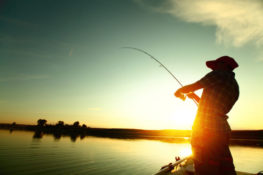
Fishing is a pastime that is enjoyed by many people, particularly to those who live in the coastal bend. As a person who has enjoyed fishing and that has just moved to Corpus Christi, life has presented me with brand new opportunities to explore and try out new types of fishing. Coming from Central Texas, most of my experiences stem from fishing the various rivers and lakes located around Central Texas. There is nothing quite like grabbing an ultra-light setup, heading out the door, and going down to the river for some relaxation.
Because I am not used to fishing in salt water, I have had to change my tactics, approach, and gear for saltwater fishing. I have come to learn that while you can still use tackle for saltwater fishing, there are many who assert that bait fishing is the way to go. My personal, and very limited, experience with saltwater fishing has shown me that I am slightly more effective with tackle when compared to bait fishing. This may be due to my freshwater fishing roots and how I was taught to fish from several good friends.
In order to be successful, one must also have the correct gear. I have found that extensive research is necessary to ensure the best results possible. However, most importantly, is that you are taking proper measures to ensure your safety when fishing. Here are a few safety tips provided by the Weather Channel that any fisherman either new or old should know.
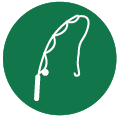 Using Tackle Safely
Using Tackle Safely
- Always handle fishing tackle responsibly.
- Make sure to look behind you before casting so that your hook will not catch a power line, tree, or another person.
- Don’t leave your tackle lying on the ground. Someone may trip and fall on it, step on a hook, or even break your tackle.
- If a hook is deep inside of a fish’s mouth, don’t put your hand inside. Instead, use some kind of a hook remover to carefully remove the hook. If this doesn’t work, cut the line as far back as you safely can to release the fish.
- Always remove hooks and lures from your line and store them in your tackle box when moving your equipment.
Safe Dressing:
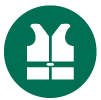 Whenever around water, small children should wear a Coast Guard-approved personal flotation device (PFD) that fits properly.
Whenever around water, small children should wear a Coast Guard-approved personal flotation device (PFD) that fits properly.
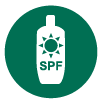 Always wear sunscreen on exposed areas like your face, neck, and hands. The sun ‘s rays can damage your skin and give you a painful burn.
Always wear sunscreen on exposed areas like your face, neck, and hands. The sun ‘s rays can damage your skin and give you a painful burn.
 Wear a hat. Hats keep your head cool in the summer and warm in the winter. They also can help keep the sun out of your eyes and protect your head from hooks during a stray cast.
Wear a hat. Hats keep your head cool in the summer and warm in the winter. They also can help keep the sun out of your eyes and protect your head from hooks during a stray cast.
 Protect the only eyes you have by wearing some kind of glasses. Sunglasses protect your eyes from hooks and the sun’s harmful rays. Polarized sunglasses also help you see below the surface of the water to see fish and other objects.
Protect the only eyes you have by wearing some kind of glasses. Sunglasses protect your eyes from hooks and the sun’s harmful rays. Polarized sunglasses also help you see below the surface of the water to see fish and other objects.
 Shoes should always be worn whether fishing on shore, in a boat, or wading in the water. Stray hooks, glass, sharp rocks, and other objects on shore and in the water could cut your bare feet. In a boat, shoes designed to keep your feet from slipping in a wet boat could help prevent you from taking an unexpected dip into the water.
Shoes should always be worn whether fishing on shore, in a boat, or wading in the water. Stray hooks, glass, sharp rocks, and other objects on shore and in the water could cut your bare feet. In a boat, shoes designed to keep your feet from slipping in a wet boat could help prevent you from taking an unexpected dip into the water.
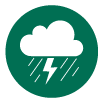 Always dress for the weather and be prepared for sudden changes.
Always dress for the weather and be prepared for sudden changes.
Basic Boating Safety:
- Make sure all required equipment and a first-aid box are in the boat before going fishing. When an emergency happens, you don’t want to have to go back to shore to get what you forgot.
- Know how to properly use the rescue devices.
- Stay seated as much as possible while in a boat.
- Never overload a boat. Know how much weight your boat can safely carry and always evenly distribute your load.
- Do not use drugs or drink alcohol when boating. Over half of all drowning victims were using alcohol or drugs.
- Remain a safe distance from low water dams and other restricted areas.
- Keep your eyes on the weather. Leave the water before the storms arrive. If on the water and caught in a storm, make sure your life jacket is on and cautiously travel to shore and beach the boat.
- Travel slowly in shallow areas and areas of flooded trees.
- When traveling at night, be sure your running lights are on so others can see you.
If you have suffered an injury please feel free to contact the attorneys at Herrman and Herrman, P.L.L.C., at 361-882-4357 for a free consultation.








